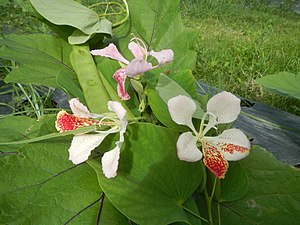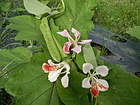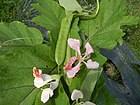Note: This is a project under development. The articles on this wiki are just being initiated and broadly incomplete. You can Help creating new pages.
Difference between revisions of "Bauhinia purpurea"
(Created page with "{{stub}} ==Uses== {{Uses|}}, {{Uses|}}, {{Uses|}}, {{Uses|}}, {{Uses|}}, {{Uses|}}, {{Uses|}}, {{Uses|}}, {{Uses|}}, {{Uses|}}, {{Uses|}}. ==Parts Used== {{Parts Used|}}, {{...") |
|||
| (18 intermediate revisions by the same user not shown) | |||
| Line 1: | Line 1: | ||
| − | + | [[File:02218jfBauhinia purpurea flowers Bulacanfvf 03.jpg|thumb|right]] | |
| − | + | '''Bauhinia purpurea''' is an erect, evergreen shrub. It grows up to 7 - 10 metres tall. The tree has a wide range of local uses. It should also make an excellent pioneer species and is commonly cultivated as an ornamental. | |
==Uses== | ==Uses== | ||
{{Uses|}}, {{Uses|}}, {{Uses|}}, {{Uses|}}, {{Uses|}}, {{Uses|}}, {{Uses|}}, {{Uses|}}, {{Uses|}}, {{Uses|}}, {{Uses|}}. | {{Uses|}}, {{Uses|}}, {{Uses|}}, {{Uses|}}, {{Uses|}}, {{Uses|}}, {{Uses|}}, {{Uses|}}, {{Uses|}}, {{Uses|}}, {{Uses|}}. | ||
| + | |||
| + | ===Food=== | ||
| + | Bauhinia purpurea can be used in food. Flowers are cooked as vegetable. | ||
==Parts Used== | ==Parts Used== | ||
| − | {{Parts Used|}}, {{Parts Used| | + | {{Parts Used|Seeds}}, {{Parts Used|Flower buds}}, {{Parts Used|Flowers}}, {{Parts Used|Root}}. |
==Chemical Composition== | ==Chemical Composition== | ||
| − | <ref name="chemical composition"/> | + | Eleven new secondary metabolites (1−11), together with two known flavanones (12 and 13) and five known bibenzyls.<ref name="chemical composition"/> |
==Common names== | ==Common names== | ||
| − | {{Common names|sa=|en=|gu=|hi=|kn=|ks=|ml=|mr=|pa=|ta=|te=}} | + | {{Common names|sa=Devakanchan|en=Purple Orchid Tree, Butterfly tree|gu=|hi=Kaniar|kn=ಕಂಚುವಾಳ Kanchuvaala, ಕಂಚಿವಾಳ Kanchivaala|ks=|ml=|mr=Rakta kanchan|pa=|ta=Nilattiruvatti|te=}}<ref name="Common names"/> |
==Properties== | ==Properties== | ||
| Line 17: | Line 20: | ||
===Dravya=== | ===Dravya=== | ||
===Rasa=== | ===Rasa=== | ||
| − | |||
===Guna=== | ===Guna=== | ||
| Line 28: | Line 30: | ||
===Prabhava=== | ===Prabhava=== | ||
| + | |||
| + | ===Nutritional components=== | ||
| + | Bauhinia purpurea contains the Following nutritional components like Vitamin-C and E; Calcium, Iron, Magnesium, Potassium, Phosphorus, Sodium<ref name="Nutritional components"/> | ||
==Habit== | ==Habit== | ||
| − | {{Habit|}} | + | {{Habit|Evergreen tree}} |
==Identification== | ==Identification== | ||
| Line 49: | Line 54: | ||
==Mode of Propagation== | ==Mode of Propagation== | ||
| − | {{Propagation|}} | + | {{Propagation|Seeds}}, {{Propagation|Cuttings}}. |
| + | |||
| + | ==Cultivation Details== | ||
| + | A plant of subtropical to tropical regions where it can usually be found at elevations from 500 - 2,000 metres, exceptionally to 3,000 metres. Bauhinia purpurea is available through October to January<ref name="How to plant/cultivate"/> | ||
| + | |||
| + | ==Season to grow== | ||
| + | Dry season. | ||
| + | |||
| + | ==Required Ecosystem/Climate== | ||
| − | == | + | |
| − | <ref name=" | + | ==Kind of soil needed== |
| + | Clay; loam; sand; slightly alkaline;acidic; well-drained soil.<ref name="Kind of soil needed"/> | ||
==Commonly seen growing in areas== | ==Commonly seen growing in areas== | ||
| − | {{Commonly seen|}}, {{Commonly seen| | + | {{Commonly seen|Mixed deciduous forests}}, {{Commonly seen|On hill slopes}}. |
==Photo Gallery== | ==Photo Gallery== | ||
<gallery class="left" caption="" widths="140px" heights="140px"> | <gallery class="left" caption="" widths="140px" heights="140px"> | ||
| − | + | (Phanera purpurea) Bauhinia Orchid flower in Andhra University.jpg | |
| + | 02218jfBauhinia purpurea flowers Bulacanfvf 03.jpg | ||
| + | 02218jfBauhinia purpurea flowers Bulacanfvf 08.jpg | ||
| + | 02242jfBauhinia purpurea flowers Bulacanfvf 03.jpg | ||
| + | 02242jfBauhinia purpurea flowers Bulacanfvf 04.jpg | ||
</gallery> | </gallery> | ||
==References== | ==References== | ||
| − | |||
<references> | <references> | ||
| − | <ref name="chemical composition">[" | + | <ref name="chemical composition">[https://onlinelibrary.wiley.com/doi/abs/10.1002/jccs.199700056 Chemical constituents]</ref> |
| − | + | <ref name="Common names">[http://www.flowersofindia.net/catalog/slides/Purple%20Orchid%20Tree.html#:~:text=The%20Purple%20Orchid%20Tree%20is,favourite%20of%20many%20plant%20lovers.&text=Bauhinia%20purpurea%20can%20reach%20up,have%20a%2025%20foot%20crown. Common names]</ref> | |
| − | <ref name="Leaf">[ | + | <ref name="Leaf">[Morphology]</ref> |
| − | + | <ref name="How to plant/cultivate">[https://pfaf.org/user/Plant.aspx?LatinName=Bauhinia+purpurea Cultivation]</ref> | |
| − | <ref name="How to plant/cultivate">[ " | + | <ref name="Kind of soil needed">[http://hort.ufl.edu/trees/BAUPURA.pdf Kind of soil needed]</ref> |
| + | <ref name="Nutritional components">Forest food for Northern region of western ghat pdf by Dr. Mandar N. Datar and Dr. Anuradha S. Upadhye, MACS - Agharkar Research Institute, Pune</ref> | ||
</references> | </references> | ||
==External Links== | ==External Links== | ||
| − | * [ ] | + | * [http://www.flowersofindia.net/catalog/slides/Purple%20Orchid%20Tree.html Bauhinia purpurea on flowersofindia.net] |
| − | * [ ] | + | * [https://pfaf.org/user/Plant.aspx?LatinName=Bauhinia+purpurea Bauhinia purpurea on pfaf.org] |
| − | * [ ] | + | * [https://indiabiodiversity.org/species/show/264729 Bauhinia purpurea on indiabiodiversity.org] |
[[Category:Herbs]] | [[Category:Herbs]] | ||
| + | [[Category:Pages without herbs images]] | ||
Latest revision as of 12:49, 14 October 2021
Bauhinia purpurea is an erect, evergreen shrub. It grows up to 7 - 10 metres tall. The tree has a wide range of local uses. It should also make an excellent pioneer species and is commonly cultivated as an ornamental.
Contents
- 1 Uses
- 2 Parts Used
- 3 Chemical Composition
- 4 Common names
- 5 Properties
- 6 Habit
- 7 Identification
- 8 List of Ayurvedic medicine in which the herb is used
- 9 Where to get the saplings
- 10 Mode of Propagation
- 11 Cultivation Details
- 12 Season to grow
- 13 Required Ecosystem/Climate
- 14 Kind of soil needed
- 15 Commonly seen growing in areas
- 16 Photo Gallery
- 17 References
- 18 External Links
Uses
[[:Category:Ayurvedic Herbs known to be helpful to treat |]], [[:Category:Ayurvedic Herbs known to be helpful to treat |]], [[:Category:Ayurvedic Herbs known to be helpful to treat |]], [[:Category:Ayurvedic Herbs known to be helpful to treat |]], [[:Category:Ayurvedic Herbs known to be helpful to treat |]], [[:Category:Ayurvedic Herbs known to be helpful to treat |]], [[:Category:Ayurvedic Herbs known to be helpful to treat |]], [[:Category:Ayurvedic Herbs known to be helpful to treat |]], [[:Category:Ayurvedic Herbs known to be helpful to treat |]], [[:Category:Ayurvedic Herbs known to be helpful to treat |]], [[:Category:Ayurvedic Herbs known to be helpful to treat |]].
Food
Bauhinia purpurea can be used in food. Flowers are cooked as vegetable.
Parts Used
Seeds, Flower buds, Flowers, Root.
Chemical Composition
Eleven new secondary metabolites (1−11), together with two known flavanones (12 and 13) and five known bibenzyls.[1]
Common names
| Language | Common name |
|---|---|
| Kannada | ಕಂಚುವಾಳ Kanchuvaala, ಕಂಚಿವಾಳ Kanchivaala |
| Hindi | Kaniar |
| Malayalam | |
| Tamil | Nilattiruvatti |
| Telugu | |
| Marathi | Rakta kanchan |
| Gujarathi | |
| Punjabi | |
| Kashmiri | |
| Sanskrit | Devakanchan |
| English | Purple Orchid Tree, Butterfly tree |
Properties
Reference: Dravya - Substance, Rasa - Taste, Guna - Qualities, Veerya - Potency, Vipaka - Post-digesion effect, Karma - Pharmacological activity, Prabhava - Therepeutics.
Dravya
Rasa
Guna
Veerya
Vipaka
Karma
Prabhava
Nutritional components
Bauhinia purpurea contains the Following nutritional components like Vitamin-C and E; Calcium, Iron, Magnesium, Potassium, Phosphorus, Sodium[3]
Habit
Identification
Leaf
| Kind | Shape | Feature |
|---|---|---|
Flower
| Type | Size | Color and composition | Stamen | More information |
|---|---|---|---|---|
| {{{5}}} |
Fruit
| Type | Size | Mass | Appearance | Seeds | More information |
|---|---|---|---|---|---|
Other features
List of Ayurvedic medicine in which the herb is used
Where to get the saplings
Mode of Propagation
Cultivation Details
A plant of subtropical to tropical regions where it can usually be found at elevations from 500 - 2,000 metres, exceptionally to 3,000 metres. Bauhinia purpurea is available through October to January[5]
Season to grow
Dry season.
Required Ecosystem/Climate
Kind of soil needed
Clay; loam; sand; slightly alkaline;acidic; well-drained soil.[6]
Commonly seen growing in areas
Mixed deciduous forests, On hill slopes.
Photo Gallery
References
- ↑ Chemical constituents
- ↑ Common names
- ↑ Forest food for Northern region of western ghat pdf by Dr. Mandar N. Datar and Dr. Anuradha S. Upadhye, MACS - Agharkar Research Institute, Pune
- ↑ [Morphology]
- ↑ Cultivation
- ↑ Kind of soil needed
External Links
- Ayurvedic Herbs known to be helpful to treat
- Herbs with Seeds used in medicine
- Herbs with Flower buds used in medicine
- Herbs with Flowers used in medicine
- Herbs with Root used in medicine
- Herbs with common name in Kannada
- Herbs with common name in Hindi
- Herbs with common name in Tamil
- Herbs with common name in Marathi
- Herbs with common name in Sanskrit
- Herbs with common name in English
- Habit - Evergreen tree
- Index of Plants which can be propagated by Seeds
- Index of Plants which can be propagated by Cuttings
- Herbs that are commonly seen in the region of Mixed deciduous forests
- Herbs that are commonly seen in the region of On hill slopes
- Herbs
- Pages without herbs images





